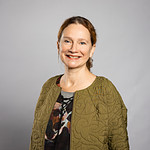Curious Minds: A Positive Approach to Talent
- Research stories

Every child is talented, if approached in a talented way. That is the starting point of the research network Curious Minds.
From within various knowledge domains research is being conducted into how talented behaviour can be stimulated. By doing so, the research network works on more equality of opportunity in education by offering a talent-oriented context, in which educational professionals approach each child as talented and optimally match the developmental needs of every child aged 0 - 14 years. For example, Hanze researchers Ineke Haakma and Linda Hendriks are studying the promotion of talent and creativity within art education in primary education, and their fellow researcher Frank Assies is investigating the effect of talent-oriented working within teacher training colleges. Henderien Steenbeek is co-supervisor of the PhD research of Assies and Hendriks and also the leader of the Curious Minds network.
Curious Minds was created as a result of TalentenKracht, a national project about the talent of young children for science and technology. Several Dutch and Belgian institutions for higher education participated in this national project, including Hanze and the University of Groningen. In 2017, the research was expanded into other knowledge domains, such as art education, exercise and talent and language development, and to specific target groups such as children with special educational care needs. This is how Curious Minds came into being. 'The motto of the research network is: everyone is talented if approached in a talented way. Based on this motto, pedagogical and didactic strategies are researched and developed, and applied in education. This approach strengthens the didactic skills of teachers; a generally accepted effective educational intervention', says Henderien Steenbeek, the driving force behind the project. Steenbeek is a lecturer in Diversity in Learning and Behaviour at Hanze and also works as an associate professor of developmental psychology at the University of Groningen.
Talent and talent development are broad and difficult to define concepts, as the researchers involved in Curious Minds realize. This is also the case for Frank Assies, who, as a PhD candidate and lecturer at the Pedagogical Academy of Hanze, is researching talent-oriented working within teacher training colleges. ‘In my opinion talent development is about discovering what you do not yet see in yourself or your student and then continuing on from that. The interaction between pupil and teacher is important, from one-way traffic to mutual impact. Talent is also not about being the best in relation to the group, but about comparing yourself to your former self and seeing what steps you have taken.' It is a way of looking at children and their development in which talent is not something you have, but something that appears (emergent), in which the environment of the child is very important.
Instead of being performance-driven and achieving high grades, talented behaviour is characterised by curiosity, enthusiasm, discovery, wonder, creativity, critical thinking and making connections. Within Curious Minds, the researchers argue that teachers can stimulate this talented behaviour in students by acting talentedly themselves. This is where the TalentsStrength approach comes in. 'Three pedagogical didactic pillars are central to this: providing space, providing structure and adaptive support,' explains Professor Steenbeek. An example of providing space is asking exploratory questions. Structure can be provided by setting goals at the beginning of a lesson. Adaptive support has to do with responding to cognitive and/or social needs of students and the resources that a teacher uses to achieve this. But it's not a recipe book, it's mainly about how you look at children and their development!’
Based on the three pillars of providing space, structure and adaptive support, the researchers are developing a wide range of practical products together with the professional practice. 'For example, we work together with the partnership Academic Training Schools Northern Netherlands, the Primoraat of Public Education Groningen and RENN4, based on this vision of strengthening the power of teachers to act and thus offering equal opportunities to all pupils,' says Steenbeek. The vision of talent-oriented working is also one of the pillars in the education of the Hanze Education Academy and forms the basis of the new curriculum of the Pedagogical Academy. Furthermore, the vision is central to the Master's in Talent Development and Diversity, where professionals from PO, VO, MBO and HBO take the knowledge and skills they have acquired to their own workplace.
A coaching methodology has also been developed (video feedback coaching-on-the-job), which has been applied to multiple domains and target groups. For example, the methodology has been further developed for children with Autism Spectrum Disorder, in collaboration with various professional practice partners, such as Cosis and Team 050. The aim of this is that these children are also approached based on their talent (strength) instead of on the problem (the complaint, diagnosis). The coaching methodology means that educational professionals follow a trajectory in which their lessons are filmed and they can reflect on their own teaching practice. For his PhD research, Assies applied the trajectory for higher professional education teachers within the math section of three different teacher training colleges: in Groningen, Zwolle and Almere. 'Because students often experience teaching situations differently from their teachers, teachers really benefit from looking at footage from their own lessons instead of only being able to reflect on their lessons based on their own experiences. Insights they have gained from previous lessons can be applied immediately in their next lessons,' says Assies.
Ineke Haakma and Linda Hendriks also applied the coaching methodology within their research. Haakma used it in (visual) art education and Hendriks applied it in music education in primary schools. 'In addition to insight into and further development of teachers' own teaching practice during coaching, the analysis of lecture recordings provides input for good practices, for example in art and music education at primary school. We want to offer teachers useful tools and create awareness among them of how they behave. It is not our goal to offer a kind of cookbook with precisely described recipes for perfect lessons,' Steenbeek explains. Ultimately, all Curious Minds' research projects are about how you can best approach students in a positive way, in order to stimulate promising growth in all children.'
The tendency to focus on what is not (yet) going well rather than what is already going well is often not only applicable to the way teachers approach students. It also applies to how teachers view themselves, Assies, Haakma and Hendriks notice. 'Because primary school teachers have to teach so many different subject areas, they often have doubts about their own level of knowledge and competences. They often think: can I do this?' explains Hendriks. Assies indicates that this is often not a bad thing at all. 'It is precisely by allowing children to discover for themselves, asking open questions, talking about a subject and allowing the learning process to develop in the conversation, that you can stimulate talented behaviour in children.' The researchers are enthusiastic about the coaching process and see opportunities for using it more broadly than in just primary education and teacher training colleges. The first results also indicate that teachers have started to teach in a more autonomy-supporting way as a result of the coaching.
Henderien Steenbeek also supervises Marielle van den Hul-Kuijten, who researches the phenomenon of talent moments in a learning community of (studying) teachers in the PhD trajectory Emerging talent in learning communities and the role of fellow students. The project connects the Hanze-wide research group Learning in Learning Community with the research network Curious Minds.
Haakma and Hendriks would like to see the programme anchored in the curricula of teacher training programmes at the conservatoire and the art academy, among others. The schools with which Haakma and Hendriks have collaborated are also enthusiastic. 'Participating teachers said that it has opened their eyes, but that it is an intense experience. It is a very personal development process in which teachers are vulnerable, but can also make great leaps,' concludes Hendriks.
More information about the methodology for children with Autism Spectrum Disorder
Text: Anne Floor Lanting

Professor Curious Minds
Zernikeplein 9, 9747 AS Groningen
How satisfied are you with the information on this page?